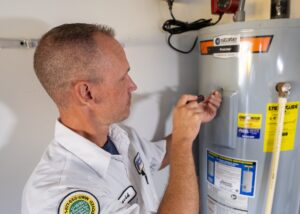The Four Types of Water Heaters: Which One’s Right for Your Home?
So you’re in the market for a new water heater? Whether your old one finally gave up the ghost or you’re building a new home, choosing the right water heater can feel overwhelming. Trust me, I get it – there are way more options out there than you might expect, and each one has its own set of pros and cons.
The good news is that most water heaters fall into four main categories, and once you understand what each type brings to the table, picking the right one becomes a lot easier. Let’s dive into your options and figure out which one makes the most sense for your situation.
The Classic Choice: Conventional Storage Tank Water Heaters
Let’s start with the old reliable – the conventional storage tank water heater. This is probably what you picture when someone says “water heater.” It’s basically a big insulated tank that keeps a bunch of hot water ready to go whenever you need it.
These workhorses come in sizes ranging from 30 to 80 gallons, and you can power them with electricity, natural gas, propane, or even oil. Most homes have either electric or gas models, since those are the most practical for most situations.
The upside? They’re pretty straightforward. The initial cost won’t break the bank, installation is usually pretty simple (especially if you’re just swapping out an old one), and you’ve got hot water ready to go 24/7. Need a hot shower at 6 AM? No problem – that water’s been sitting there waiting for you.
The downside? Well, keeping all that water hot all the time isn’t exactly energy-efficient. You’re basically paying to heat water even when you’re not using it, which can add up on your energy bills. Plus, once you use up all the hot water in the tank, you’re stuck waiting for it to heat up again. Ever been the last person to shower in a house full of people? Yeah, you know what I’m talking about. They also take up a fair amount of space, so if you’re working with a tiny utility room, that could be an issue.
The Space Saver: Tankless Water Heaters
Now we’re talking about the sleek, modern option – tankless water heaters, also called on-demand water heaters. Instead of keeping a big tank of hot water sitting around, these units heat water instantly as it flows through.
When you turn on the hot water tap, cold water shoots through the unit and gets heated up by either gas or electricity on its way to your faucet. Pretty neat, right?
Why people love them: They’re incredibly energy-efficient since they only heat water when you actually need it. No more paying to keep 50 gallons of water hot while you’re at work. They’re also compact – you can mount them on a wall and free up all that floor space. And they typically last longer than conventional tank heaters.
The catch? They cost more upfront, and installation can get complicated. You might need to upgrade your electrical system or gas lines to handle the demand. Also, while you’ll never “run out” of hot water, the flow rate has limits. Try to run the dishwasher, washing machine, and two showers at the same time, and you might find yourself with lukewarm water everywhere.
The Efficiency Champion: Heat Pump Water Heaters
Here’s where things get interesting. Heat pump water heaters (sometimes called hybrid water heaters) are like the Tesla of water heating. Instead of directly heating water, they use electricity to move heat from the surrounding air into the water. It’s basically a refrigerator working in reverse.
The impressive part: These things can be two to three times more energy-efficient than regular electric water heaters. Your energy bills will thank you, and in humid climates, they actually help dehumidify the air around them as a bonus.
The reality check: They cost more upfront, and they’re picky about where you install them. They need space – both physical space and the right temperature range (they work best when the surrounding air stays between 40-90°F year-round). If you live somewhere that gets really cold, they might struggle to work efficiently.
The Eco-Warrior: Solar Water Heaters
Solar water heaters are exactly what they sound like – they use the sun’s energy to heat your water. They typically have solar collectors (usually on your roof) and a storage tank. Some systems actively circulate water through the collectors, while others rely on natural circulation.
The dream scenario: Once they’re installed, the operating costs are minimal since sunlight is free. They’re incredibly environmentally friendly, and many areas offer tax credits and incentives that can help offset the initial cost.
The real world: The upfront cost is significant, and you’re at the mercy of the weather. Cloudy days and high-demand periods often require a backup heating system. Installation can be complex, especially if you need to modify your roof, and they require quite a bit of space.
Making the Right Choice for Your Home
So which one should you choose? It really depends on your specific situation. Here are some questions to ask yourself:
- How much hot water does your household actually use?
- What’s your budget for both initial costs and ongoing energy bills?
- How much space do you have for installation?
- What energy sources are available and affordable in your area?
- How long are you planning to stay in your home?
If you’re just looking for a straightforward replacement and don’t want to mess with your existing setup, a conventional tank heater might be your best bet. If you’re focused on energy efficiency and have the budget for it, tankless or heat pump models could save you money in the long run.
When to Call in the Experts
Here’s the thing – choosing and installing a water heater isn’t always a simple decision. If you’re not sure which type makes sense for your home, or if your current water heater is acting up, it’s worth getting a professional opinion. They can assess your specific needs, check your home’s infrastructure, and make sure everything gets installed safely and up to code. The right water heater should serve you reliably for years to come, so it’s worth taking the time to make an informed decision.

